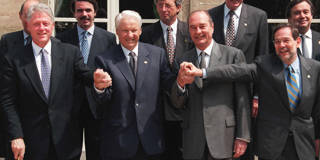OnPoint Subscriber Exclusive
Interviews feature exclusive interviews with prominent leaders and thinkers on issues of global importance.

The World Order After the Ukraine War
While Russia's invasion of Ukraine in February came as a shock to much of the world, in a sense, it was a continuation of a war that began in 2014. Finding a sustainable solution to the crisis will require an understanding of this history as much as an aptitude for diplomacy.
Nina L. Khrushcheva: First, there was the world-changing COVID-19 pandemic. Then, on February 24, 2022, Russian President Vladimir Putin launched his “special military operation” in Ukraine, and the world changed even more. This new reality demands a new set of rules that not only reflects the current state of affairs, but also recognizes how we got here.
I’m Nina Khrushcheva, Professor of International Affairs at the New School in New York. Today, I’m honored to discuss this topic with Javier Solana, President of EsadeGeo – Center for Global Economy and Geopolitics. Solana was NATO’s secretary-general in the 1990s, a time when the Alliance was undergoing major changes following the Soviet Union’s collapse and the Cold War’s end. He subsequently served as Secretary-General of the Council of the European Union and EU High Representative for the Common Foreign and Security Policy.
Javier, you helped to write the rulebook for the post-Cold War world, including both the military and foreign-policy chapters. Has Russia’s war on Ukraine changed that rulebook forever, or can some elements of it still be salvaged?
Javier Solana: When I was NATO Secretary-General, I – like many others – believed that we in the West needed to devise a solid, coherent policy toward Russia, which was then led by its first president, Boris Yeltsin. So, in January 1997, we launched negotiations aimed at securing Russia’s agreement on the opening of NATO to more countries.